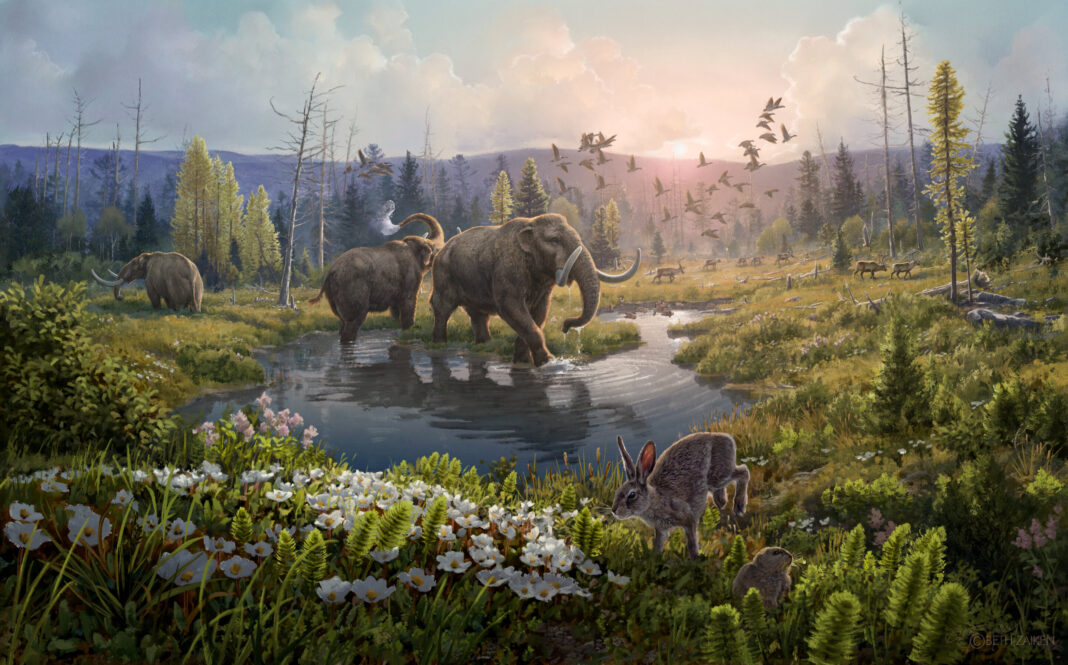(University of Cambridge) Two-million-year-old DNA has been identified for the first time – opening a “game-changing” chapter in the history of evolution.
Microscopic fragments of environmental DNA were found in Ice Age sediment in northern Greenland. Using cutting-edge technology, researchers determined that the fragments are one million years older than the previous record for DNA sampled from a Siberian mammoth bone.
The ancient DNA has been used to map a two-million-year-old ecosystem that weathered extreme climate change.
The discovery was made by a team of scientists led by professors Eske Willerslev and Kurt Kjær. Willerslev is a Fellow of St John’s College, University of Cambridge, and director of the Lundbeck Foundation GeoGenetics Center at the University of Copenhagen, at which geology expert Kjær is also based.
The results of the 41 usable samples found hidden in clay and quartz are published today in Nature.
“A new chapter spanning one million extra years of history has finally been opened, and for the first time we can look directly at the DNA of a past ecosystem that far back in time,” Willerslev said.
“DNA can degrade quickly, but we’ve shown that under the right circumstances, we can now go back further in time than anyone could have dared imagine.”
Added Kjær: “The ancient DNA samples were found buried deep in sediment that had built up over 20,000 years. The sediment was eventually preserved in ice or permafrost and, crucially, not disturbed by humans for two million years.”
The incomplete samples, a few millionths of a millimetre long, were taken from the København Formation, a sediment deposit almost 100 metres thick tucked in the mouth of a fjord in the Arctic Ocean in Greenland’s northernmost point. The climate in Greenland at the time varied between Arctic and temperate and was between 10-17C warmer than Greenland is today. The sediment built up in a shallow bay.
Scientists discovered evidence of animals, plants, and microorganisms including reindeer, hares, lemmings, birch and poplar trees. Researchers even found that Mastodon, an Ice Age mammal, roamed as far as Greenland before becoming extinct. Previously, it was thought the range of the elephant-like animals did not extend from its known origins of North and Central America.
Detective work by 40 researchers from Denmark, the U.K., France, Sweden, Norway, the U.S., and Germany unlocked the secrets of the fragments of DNA. The process was painstaking – first they needed to establish whether there was DNA hidden in the clay and quartz, and if there was, could they successfully detach the DNA from the sediment to examine it? The answer, eventually, was yes. The researchers compared every DNA fragment with extensive libraries of DNA collected from present-day animals, plants, and microorganisms. A picture began to emerge of the DNA from trees, bushes, birds, animals, and microorganisms.
Some of the DNA fragments were easy to classify as predecessors to present-day species, others could only be linked at genus level, and some originated from species impossible to place in the DNA libraries of animals, plants and microorganisms still living in the 21st century.
The two-million-year-old samples help academics build a picture of a previously unknown stage in the evolution of the DNA of a range of species still in existence.
“Expeditions are expensive, and many of the samples were taken back in 2006 when the team were in Greenland for another project,” Kjær said. “They have been stored ever since.
“It wasn’t until a new generation of DNA extraction and sequencing equipment was developed that we’ve been able to locate and identify extremely small and damaged fragments of DNA in the sediment samples. It meant we were finally able to map a two-million-year-old ecosystem.”
https://phys.org/news/2022-12-discovery-world-oldest-dna-million.html


